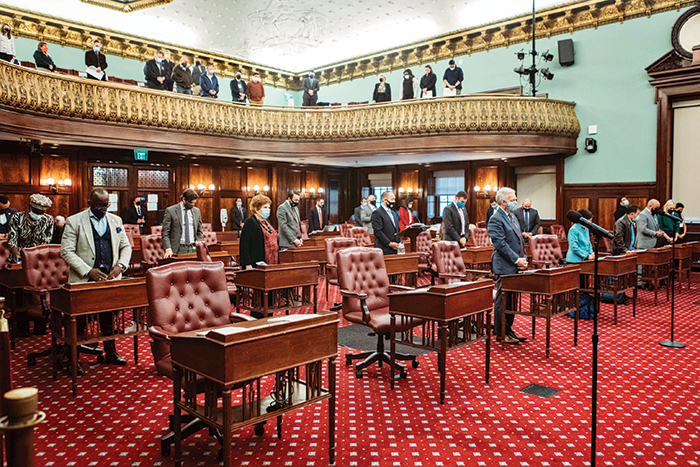Photo Courtesy of Jeff Reed/NY City Council
Councilman Rodriguez’s bill will authorize the use of pay-by-plate parking meters in addition to pay-and-display parking meters.
By Michael V. Cusenza
The City Council recently voted in favor of several bills related to parking rules in the five boroughs.
Int. No. 2422-A, sponsored by Councilman Ydanis Rodriguez (D-Manhattan), will authorize the use of pay-by-plate parking meters in addition to pay-and-display parking meters.
Parking meters currently used throughout the City are “pay-and-display” meters that dispense a paper receipt that must be displayed on a vehicle’s dashboard, or in a visible and secure location on a motorcycle.
In contrast, “pay-by-plate” parking meters require someone who wishes to park in a metered location to enter their vehicle or motorcycle’s license plate information to register payment for parking. The Department of Transportation would be able to track payment by the vehicle’s license plate instead of by a paper receipt.
The pay-by-plate parking system has been used successfully for many years in other cities, and would streamline the process by which motorists pay for parking.
Additionally, the pay-by-plate parking system would be easier for enforcement purposes and would help with addressing placard abuse. It would also lead to less paper waste because paper receipts are not printed.

Photo Courtesy of Emil Cohen/NY City Council
The City Council recently voted in favor of several pieces of legislation.
Before DOT makes changes to the parking meter rates or replaces a pay-and-display parking meter with a pay-by-plate parking meter, DOT would provide 30-days written notice to the Council Member and Community Board in whose district such change would occur and post such change on the DOT’s website.
Additionally, parking time will only be authorized on the blockface, or street section, for which it was purchased and could not be transferred between blockfaces.
Int. No. 2279-A will increase the number of loading zones in neighborhoods citywide. Additionally, the bill will require the Department of Transportation to establish a public-facing methodology for determining where loading zones are necessary to enhance safety and reduce congestion.
While the uses of the City’s streets – for transportation, commerce and recreation – have undergone many recent changes, curb space dedicated to the loading and unloading of personal, commercial and for-hire vehicles remains limited.
“I am proud to have passed Intro 2279 today, a bill to expand loading zones across New York City,” said Councilman Antonio Reynoso (D-Brooklyn), the bill’s sponsor. “This legislation will require the Department of Transportation to ramp up the creation of loading zones in neighborhoods across the city. Most New Yorkers receive deliveries, and we need a way to get them to folks more efficiently. Loading zones will help do this, all while making our streets safer, reducing congestion, and restoring our streets as the common good they are.”
The lack of such space can have significant negative impacts on neighborhoods through the effects of traffic congestion, harmful emissions, and safety hazards.
Among other factors, the methodology must consider commercial and residential density, and requests from elected officials and the public.
DOT would be required to implement at least five loading zones annually in each neighborhood tabulation area that meets the methodology, and to immediately implement at least 500 total loading zones per year in the first three years following the law’s effective date
By January 1, 2023, the department would also be required to report on the program and provide publicly accessible information on the location of all loading zones.
Int. No. 2277-A will reform existing laws governing truck loading zones and codify new curb management practices.
Truck loading zones are an effective solution to the problems of double-parking and blocked sidewalks that often occur when trucking companies drop off commercial deliveries, small businesses make service calls, and workers unload tools or materials in heavily utilized public spaces.
However, truck loading zones are only usable if they are well-regulated, and not blocked by unauthorized vehicles or construction activity.
“For too long, commercial trucks have done their business on public streets without paying their fair share,” said Councilman Keith Powers (D-Manhattan). “My bill, Int. 2277, will ensure that commercial trucks cannot unnecessarily hover and take up room on the street, while decreasing congestion and truck emissions. I’m proud to be working to make our streets cleaner, safer, and less crowded with vehicles, and thank Speaker Johnson for his support.“
The bill will require that all permits of 180 days or more for a street segment with a truck loading zone carry a stipulation that such zone may not be occupied or obstructed. In the event that permitted work necessitates a loading zone obstruction, DOT may require that the applicant maintain a temporary loading zone, and revoke a permit or refuse to renew a permit for non-compliance.
The bill would also amend the Administrative Code to prohibit the use of city-issued parking placards in certain spaces in the central business district of Manhattan, including truck-loading zones.
Further, the bill would codify new and existing regulations for truck loading zones and commercial parking meter areas, including those related to how such spaces are metered or reserved and the lengths of time that they may be occupied.
Finally, the bill would allow DOT to authorize cargo bicycles or other sustainable modes to use loading zones and to create reduced rates for zero emission vehicles.
Additionally, the council voted in favor of a bill requiring annual reports from all five district attorneys. Int. No. 1392-A, sponsored by Speaker Johnson, will require the City’s district attorney’s offices to report annually on the basic functioning of their offices.
These annual reports, which will be posted publicly, will require each office to release data points related to decision making at various stages of a criminal case; such as, data on decisions to prosecute or dismiss a case following arrest, bail recommendations, and average length of a case before a disposition.
The report also requires the numbers to be disaggregated by offense, and the race, gender and age of the defendant.
Currently, there are no requirements that the City’s district attorneys conduct any public reporting on office function.
Although some local district attorneys issue periodic reports, there is no uniformity in such reporting and very little data is publicly released regarding prosecutorial conduct.
As a result, there is significant lack of transparency regarding prosecutorial decision making in a manner that limits effective oversight of the district attorneys and hinders public trust in the criminal justice process.
The council also voted in favor of a bill requiring some City agencies to be capable of issuing warnings for first-time violations.
Recognizing the difficulty that many small businesses have in complying with the myriad laws and regulations that apply to them, certain Administrative Code provisions permit the enforcing city agency to issue a written warning in lieu of a citation for a first-time infraction. Agency inspectors are not always able to issue such warnings, however, because they lack the equipment necessary to determine whether a violation observed in the field is a first, second, third or subsequent violation.

